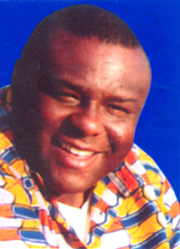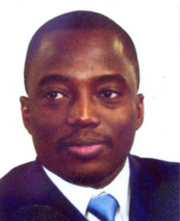Joseph Kabila, 35, who won 44.8 percent of the first round presidential vote on 30 July. |
KINSHASA, 29 Oct 2006 (IRIN) - Voting began on Sunday in the Democratic Republic of Congo in a presidential run-off marking the official completion of a transition from war to peace that began in 2003.
Incumbent President Joseph Kabila, 35, and Jean-Pierre Bemba, 44, had swept aside a field of 33 candidates in the first round on 30 July. Kabila won 44.8 percent of the vote and Bemba 20 percent. A candidate needed to garner 51 percent plus one vote to be declared the outright winner in the first round. The winner of the second round will be decided by a simple majority.
There are 50,045 polling stations open, according to the chairman of the Independent Electoral Commission, Apollinaire Malumalu. Each office will count their ballots, then the voting papers will be transported to compilation centres and the provisional results announced.
In the run-up to this round, the country has been tense and there have been several incidents of violence between Kabila's and Bemba's bodyguards. The most sensitive area of contention is the capital, Kinshasa, where on 20 August two days of fighting broke out between Kabila's guards and those of Bemba. International institutions supporting the transition to democracy in the DRC intervened to reduce tensions.
The DRC, endowed with considerable mineral resources, making it potentially Africa's wealthiest nation, has had a turbulent political history. For five years, it experienced a civil war that eventually involved several African countries, some fighting against the government of the time.
The war, in which Kabila and Bemba took part as combatants, killed four million people, mostly through hunger and disease, and displaced five million. This has presented the country with a huge humanitarian challenge. During their 15-day campaign to the run-off, both presidential candidates expressed their determination to end this tragedy by restoring order to the country.
"There are five priorities for the rectification of the country after the elections, but the priority of priorities is security," Kabila told reporters at a news conference on Friday.
In a separate news conference on Thursday, Bemba said: "Without safety we will not be able to do anything. If elected, our first action will be to restore security."
 |
| Jean-Pierre Bemba, 44, runner up in the first round ballot on 30 July, with 20 percent of the vote. |
"If obliged to help them return to their countries he will utilise robust methods," Moise Musangana, the spokesman for Bemba's Mouvement de libération du Congo, said.
Bemba has said the presence of armed Congolese and foreigners has been the main reason for the continued displacement of at least one million people in the country.
The United Nations Office for the Coordination of Humanitarian Affairs in the DRC has said that four million of the five million people displaced during the war had been resettled. The majority of them are in the east of the country.
Since 2002, nearly 17,000 primarily Rwandan fighters and their dependents have been repatriated voluntarily, under a scheme supervised by the UN Mission to the DRC. Despite this, nearly 15,000 foreign armed combatants are still present in the east and northeast of the country. A small number are Ugandan and Burundian rebels but most are former Rwandan army troops. Known as the ex-FAR, they and their Interahamwe militia allies are accused of instigating the 1994 Rwandan genocide. They have been operating in the east of the country where they have been accused of violence, theft and rape.
Kabila said during his news conference that this problem had almost been solved and the government controlled 99.9 percent of the country. However, he said, it was necessary to build a republican army - one that represented all peoples of the country.
Efforts to achieve this have been slow. Since the beginning of this initiative in June, only 14 brigades - each comprising 3,500 men - have been formed. It was hoped to have 18 brigades ready before the elections.
Kabila and Bemba said if elected they would complete the process speedily.
The brigades, comprising former rival factions, have been deployed to the troublesome Ituri District in the northeast where an armed group created in June 2005, called the Mouvement des volontaires congolais, formed from an alliance of various militiamen who refused to disband and be integrated into the national army, have maintained hostilities. At least 16,500 combatants of six armed groups and militia - transformed into political parties or disarmed - are awaiting integration into the regular army.
These Ituri militia have been fighting since 1999, leading to the deaths of at least 50,000 and the displacement of hundreds of thousands more, according to NGOs.
In the southeastern province of Katanga, militia previously supported by the government have resisted government disarmament efforts. The militias have continued to attack civilians, causing hundreds of thousands to flee. The army this year launched an operation to disarm and disband them.
Kabila and Bemba have both said that apart from integrating the military they would rebuild dilapidated barracks and other military infrastructure dating to the colonial period 46 years ago. In 1960, the police numbered 50,000 men but today this has tripled without a corresponding increase in facilities.
Both have also said they would fight against impunity, corruption and bad governance. They said fighting poverty would remain a priority by creating jobs.
[On the Net: Countdown in the Congo http://www.irinnews.org/drcelection.asp]
ei/oss/mw
Related articles
- • UN Security Council Calls on Rwanda to Stop Supporting M23 Rebels in DR Congo (February 22, 2025)
- • 'Deadly environment' plus 'political and social' obstacles hinder Ebola fight, Security Council hears (July 24, 2019)
- • Ebola outbreak declared an international Public Health Emergency (July 17, 2019)
- • Felix Tshisekedi Sworn In as DR Congo President (January 24, 2019)
- • Constitutional Court Declares Tshisekedi Winner of Presidential Election (January 19, 2019)
- • Felix Tshisekedi Vows to Be the President of All Congolese (January 10, 2019)
- • Felix Tshisekedi Elected DR Congo President (January 10, 2019)
- • DR Congo Delays Results of December Election (January 6, 2019)
- • Moise Katumbi blocked from entering DR Congo (August 3, 2018)
- • Jean-Pierre Bemba Returns to DR Congo (August 1, 2018)
- • At least 30 dead after massacres in Ituri (March 2, 2018)
- • Botswana Urges Joseph Kabila to Step Down (February 26, 2018)
- • No elections in DR Congo in December without electronic voting machines: INEC (February 13, 2018)
- • US Warns DR Congo Against Electronic Voting for Delayed Election (February 12, 2018)
- • Felix Tshisekedi accuses INEC of illegally prolonging Kabila's mandate (October 24, 2017)
- • DRC Seeks Arrest of Presidential Candidate Moise Katumbi (May 19, 2016)
- • Papa Wemba Is Buried in Kinshasa (May 4, 2016)
- • Papa Wemba Awarded Highest National Honor as Thousands Pay Tribute (May 2, 2016)
- • DR Congo reach final of African Nations Championship (February 3, 2016)
- • Political tensions 'running high' in DR Congo ahead of 2016 elections (October 7, 2015)
- • Rights Groups: DR Congo Must Free Pro-democracy Activists (April 13, 2015)
- • Police Open Fire on Crowd Protesting Election Law Change (January 19, 2015)
- • ICC Confirms 14-Year Sentence Against Thomas Lubanga (December 1, 2014)
- • Etienne Tshisekedi Evacuated to Belgium for Medical Treatment (August 16, 2014)
- • ICC sentences Germain Katanga to 12 years (May 23, 2014)
- • 15 dead in football match stampede in Kinshasa (May 12, 2014)
- • Kerry Calls on Kabila to Honor Constitution (May 4, 2014)
- • Kerry in DR Congo for Security Talks (May 3, 2014)
- • At least 60 killed as train derails in Katanga province (April 23, 2014)
- • Security Council extends UN mission, intervention force in DR Congo for one year (March 28, 2014)








